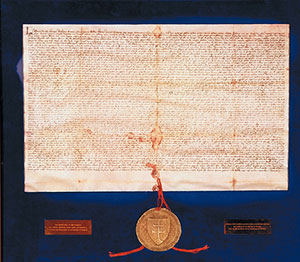
Medieval Hungary: Stephen, the first Christian King of Hungary ca. 1000 AD
The Magyars invade Hungary
When the invading Magyars conquered land in Eastern Europe from the Slavs about 900 AD, and started the country of Hungary, they didn’t stop there.
Wait, who were the Slavs?
All our medieval Europe articles
The Magyars fight their way across Europe
The Magyars immediately started raiding and plundering their neighbors further west: the Holy Roman Empire in what is now Germany and northern Italy. The Holy Roman Empire was very weak in the 900s AD, so the Hungarians won a lot of battles. They raided all the way across the Holy Roman Empire into southern France and northern Spain, and even north to Denmark.
What was the Holy Roman Empire?
The Vikings in Denmark
Otto the Great forces the Hungarians back
But in 955 AD, Otto I of the Holy Roman Empire managed to defeat the Hungarians. Under Otto, the Holy Roman Empire was stronger, and the Hungarians couldn’t raid to their west anymore. Poland, to their north, also became a united, strong country in the late 900s AD, so the Hungarians couldn’t attack them either. They attacked the Holy Roman Empire, but by 976 under Basil II, the Romans were too strong for them too.
More about Otto the Great
How Poland became a country
King Stephen becomes a Christian
By 1000 AD, King Vajk of Hungary (like the Poles and the Russians a little earlier) converted to Christianity as King Stephen, so the Pope was on Hungary’s side and other Europeans began to accept Hungary as a normal country instead of just being scared of the Magyars.
What was going on in Russia?

Medieval Hungary: the Golden Bull (1222 AD)
Stephen’s descendants ruled Hungary all through the High Middle Ages. As the Holy Roman Empire got weaker in the late 1100s, Hungary conquered some of it.
The Golden Bull
In 1222 AD, though, the rich families of Hungary – probably inspired by the Magna Carta in England – forced King Andrew II to sign the Golden Bull. The Golden Bull was a contract between the rich families and the king. Like the Magna Carta, it said that even the king had to obey the law.
What is the Magna Carta?
Also, the king couldn’t send soldiers to live in the rich people’s houses, or arrest rich people without a good reason. But where the Magna Carta said that the king couldn’t charge new taxes without the permission of the rich families, the Golden Bull said that the king couldn’t charge rich families any taxes at all! The Golden Bull also said that no Jewish person could hold any government job.
The Jews in medieval Europe
Fourth Crusade
In the early 1200s AD, Hungary was a big, successful, strong country in Central Europe. They were able to hold their own against the Crusaders in the Fourth Crusade (though they lost the city of Zara). But this was about to end.
Learn by Doing – compare the Golden Bull to the Magna Carta, the English Bill of Rights and the United States Bill of Rights
Hungary in the Late Middle Ages
Bibliography and further reading about medieval Hungary:
Need another source? Check out this history of Hungary from The Orange Files